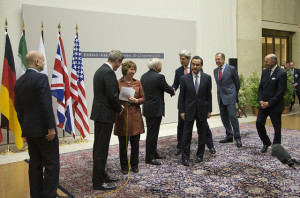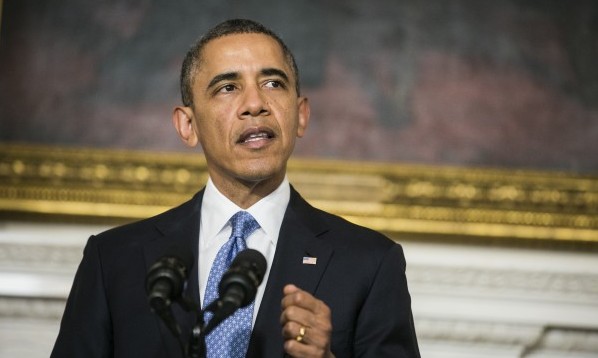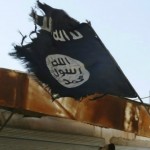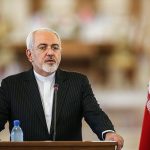by Peter Jenkins
The absence of any late September breakthrough on the central issue in the nuclear negotiation with Iran—Iran’s mastery of uranium enrichment, a technology that can be used for both civil and military purposes—has triggered speculation that the November 24 deadline for a comprehensive agreement will be missed. It has also sparked renewed debate on whether no deal would be better than the best deal likely to be on offer…
The nub of the enrichment problem appears to be Iran’s reluctance to give up the potential to produce enough highly enriched uranium (HEU) for one nuclear weapon (a “significant quantity” or SQ) in a matter of weeks (perhaps four to six). This puts Iran greatly at odds with the US and EU (and possibly Russia and China, but that is unclear), since the US and EU want Iran to be unable to produce an SQ (to “breakout”) in less than six months and would prefer at least a year.
This wide gap on enrichment and the lack of any reason to think that Iran’s negotiators will budge on this point are feeding speculation that agreement by the deadline will be unattainable.The underlying assumption is that the US and EU will not budge either.
I have accepted a poisoned chalice from the editors of Lobelog and will try with the following points to explain why tolerating the Iranian operation of nine or ten thousand—let’s say 10,000—first generation centrifuges (IR-1s) would be the lesser of two evils—the greater evil being no deal—provided it paves the way to a satisfactory settlement of all the other points on the agenda.
1) In the long run the US and EU will have to rely for a non-proliferation assurance, where Iran’s nuclear program is concerned, on the deterrence provided by the International Atomic Energy Agency (IAEA) monitoring of compliance with Nuclear Non-Proliferation Treaty (NPT) obligations, and on Iranian fear that the consequences of non-compliance could be devastating. Perpetual restrictions on centrifuge numbers would imply a perpetual double standard for which there is no basis in international law—and would therefore be totally unacceptable to Iran.
The US and EU tell themselves that relying solely on deterrence will feel more comfortable in ten or twenty years time, because during the intervening years Iran will have been able to build confidence in the peaceful nature of its intentions. In doing so, they tend to overlook that since 2003 the IAEA has not reported any Iranian failure to declare the possession of nuclear material and has not detected any undeclared nuclear activities. Nor has Iran attempted to produce HEU during the last four years, when it could easily have done so.
These years could be seen as evidence of Iran’s intention to comply with its nuclear non-proliferation obligations, and as grounds for confidence that it will not seek to breakout in the coming ten years…
The US and EU may also be overlooking that, if ten years from now Iran has had the potential to breakout in under six weeks but has not attempted to do so, then that will be a stronger reason for confidence in its peaceful intentions than if rapid breakout had not been a possibility.
2) A sense of perspective can be obtained by reflecting that several NPT Non-Nuclear-Weapon States (NNWS) have been and are in a position to breakout rapidly and that this is not generally considered cause for concern. Why not? Because it is assumed that they have no intention of acquiring nuclear weapons. Nearly 30 years after Iran, also an NPT party, was first in contact with the A.Q. Khan nuclear supply network, to obtain enrichment technology, there is still no conclusive evidence that Iran intends to acquire nuclear weapons. Indeed, the US intelligence assessment is that no such decision has been taken.
3) The risk of Iran using the 10,000 centrifuges that it wants to retain to breakout is small. IAEA monitoring, and the impossibility of predicting the consequences of detection are deterrents. If Iran wanted one SQ of HEU, it would be better advised to try to build a small unmonitored enrichment facility to house more efficient second- or third-generation centrifuges.
(In that case, some might ask, why are the Iranians so determined to retain a capacity to produce one SQ in a matter of weeks at a monitored facility? In my view, the explanation must be that they want a quasi-deterrent. Being known to be able to breakout rapidly is not much of a deterrent but it is better than nothing—and it has the merit of not entailing any violation of the NPT.)
4) The US and EU reason that a reaction time of at least six months is needed in the event of a detected breakout, to allow the UN Security Council or a coalition of the like-minded to go through the gears before stopping Iran short of one SQ by destroying its means of production. Going through the gears means first persuasion and then coercion (sanctions). But it is highly unlikely that in breakout circumstances even good friends could persuade Iran to turn back; and there is now ample evidence that the greatest effect of sanctions is to stimulate Iranian defiance.
So in reality the US and EU, faced with evidence of an ongoing breakout, would have only one option: to destroy the 10,000 centrifuges as quickly as possible (unless, when it came to the crunch, the consequences of such action seemed likely to be worse than tolerating Iranian acquisition of HEU). To render the 10,000 centrifuges at Natanz inoperable would be an easy task for the US Air Force, and could be accomplished in well under a month.

The ministers of Iran and the P5+1 at the signing ceremony of the Joint Plan of Action reached on Nov. 24, 2013.
5) Assuming that other outstanding issues can be resolved satisfactorily, a comprehensive agreement on Nov. 24 offers a much fairer prospect than no agreement. A final agreement that includes the following provisions will
generate a helpful reduction in tensions on at least one Middle Eastern front: frequent IAEA access to Iranian centrifuge workshops and assembly areas, and to Iranian fuel cycle facilities; changes to the design of the 40 MW reactor at Arak; and all the enrichment-related restrictions Iran offered in November 2013 and that Iran could hardly retract under a comprehensive agreement.
However imperfect, in Western eyes, such an agreement might seem if Iran continues to operate 10,000 IR-1s, it would be a better platform for developing the West’s relations with Iran in positive ways than no agreement. If Iran were given sufficient time, were offered EU as well as Russian civil nuclear cooperation, and were invited to join the Nuclear Suppliers Group, it might decide to adapt its nuclear program in reassuring ways. An agreement would ease political inhibitions to cooperation when Western and Iranian security interests coincide.
Conversely, no agreement could lead quickly to renewed expansion of Iran’s enrichment capacities, a reduction in IAEA access to the minimum required by the NPT, abandonment of the plan to modify the Arak reactor, and who knows what else on a broader canvas.
Those who have been advocating “no deal” seem to assume that a nice alternative would be on offer: continuation of the confidence-building measures that have been in place since January under last November’s Joint Plan of Action. But there is no guarantee that this would be the case.
To date, Iran’s gains in return for those measures have been modest (US and EU sanctions relief having been paltry and, in some cases, ineffective); they would not lose a lot by walking away from the Joint Plan. US and EU negotiators could also find it hard to detain them—their negotiating hand is weaker than “no deal” advocates imagine. If it were strong, this problem would have been resolved to Western satisfaction years ago.
Of course it would be wise of Iran to bear in mind that it will be very hard for the Obama administration to persuade Congress of the merits of a deal that does not make it impossible for Iran to breakout in under six months (irritating though it is for foreigners to be told by US negotiators that Congress will or will not tolerate this or that). It is a regrettable reality that this breakout issue has become totemic. The Iranian negotiators ought to be trying to identify room for compromise on some aspect of it. If they could find some way of excluding the option of using Iran’s stock of low enriched uranium as centrifuge feed material in a breakout, this would extend potential breakout estimates by several months. However, it would also make a quasi-deterrent less impressive. That may put this option on the wrong side of an Iranian “red line.”
Better Deal?
I can see that US and EU negotiators face a very difficult choice. They are not to be envied. All their instincts drive them in the direction of depriving Iran of an option (uranium enrichment) that other NPT parties enjoy. So often since 1979 the Islamic Republic has behaved in ways that have alarmed the West, or offended our moral sensibilities, that it is hard for us to leave Iran in possession of the capacity to make a nuclear weapon.
But, as Senator Dianne Feinstein reminded her colleagues in January, the nature of a nation can change over time. The Islamic Republic has sometimes shown scant regard for international law, not least breaching its IAEA obligations over more than a decade prior to 2003, but it does not follow that they are bent on using their enrichment capability to acquire nuclear weapons. There are plenty of reasons why it would be foolish for them to do so. And, frankly, it is not obvious that the US and EU will have a better option on Nov. 24 than to cut a deal on the basis of Iran continuing to operate 10,000 centrifuges.






Red lines. When will they end. I wonder, has the thought processes of the learned ones, the ones who demand what might be viewed as total surrender by Iran, that Iran may possess Nuclear bombs bought on the black market, perhaps paid for with oil? That they may also have the means to deliver such too, may be why Israel wants the missile capability eliminated, knowing that if they will be a target. Of course, we’ll most likely never know, unless Israel or the U.S. starts bombing Iran. Once it starts, all bets are off as to who survives. The old saying: “careful what you wish for”, should be right up there among the demanding wants.
“The Islamic Republic has sometimes shown scant regard for international law, not least breaching its IAEA obligations over more than a decade prior to 2003 …”
This is a cliched rogue-state argument. It’s fodder for mainstream media outlets.
If one considers the US’ behavior in Iraq (i.e. blatantly violating international law by attacking a sovereign nation on false intel and wreaking havoc in the region ever since then), I think Iran (in comparison) has a very mature and responsible regard for international law.
At the end of the day, what’s the real issue with Iran possessing a nuclear weapon? Not the fact that it would use it, but simply because of the fear of how it would project power with its ‘aggressive’ intentions once it acquires nuclear weapons (assuming they aspired to acquiring them!). And that’s my point: the Western powers negotiating with Iran have demonstrated time and again in the Middle East with their flawed foreign policy, who really has aggressive intentions. It’s not Iran.
Iran should not be deprived of a technology which can monitored. Instead, the US, UK, France, Russia and Israel should destroy their nuclear arsenal because of their demonstrated ability to aggressively project power through unilateral military interventions.
I would much prefer a world without any nuclear reactors at all, but …
The real tragedy here is that the Iranian nukes myth is but a charade invented by Israel (a nation with plenty of nuclear weapons that has never joined the NNPT) as a justification for the U.S. to wreak military destruction on Iran. My impression is that Israel has no genuine concern about Iran’s potential to develop nuclear weapons; Israel wants Iran destabilized and Balkanized through U.S. military action. Netanyahu unambiguously told us that in the run-up to the U.S. 2012 presidential election.
Iran’s ability to produce a single nuclear weapon also does not wash with me as grounds for credible fear in Israel when by various estimates Israel has between 75 and 350 warheads. Iran’s leaders would have to be exceedingly foolish to use a single nuclear weapon against Israel in such circumstances. Of course the Israeli “irrational rogue state” argument holds that they would. But which of those two nations is the real “rogue state,” Iran which has not invaded another country for some 300 years or Israel which has its “Samson Option” to unleash nuclear Armageddon on the entire Mideast if that nation is about to succumb to an invading force?
This is funny! “The Islamic Republic has sometimes shown scant regard for international law, not least breaching its IAEA obligations over more than a decade prior to 2003 …” Wow!
Who breaks international laws? Our government of Iran. The author seems having a short memory. Iranians are a peaceful nation of 76.4 million intelligent and brave people. Distinct from the US and Israel, Iran has not attacked any nation in the last 250 years. The Iraq-Iran War in recent history occurred only because the darling of Republican Party, former President Reagan and his neocon allies, instigated it. Indeed, the US government was aware Hussein was hurling some of the evilest chemical assaults in antiquity. Yet, the US silently offered its “friend” then a hand. How?
Iran was about to gain from a key tactical benefit by using a hole in Iraqi fortifications. US intelligence officials conveyed the area of the Iranian troops to Iraq, fully aware that Hussein’s military would attack with chemical weapons, including Sarin, a fatal nerve agent. Of course later, the Bush Administration decided the old friend, Hussein, was an evil having WMD! Then, we heard the claims were Weapons of Mass Deception!
The President must recognize a fact after six years. Iran is a major power in Middle East and the 18th economy in the globe.
Vitally, American intelligence enterprise has repeatedly stated Iran does not have a nuclear weapon program and is not seeking nuclear arms. Yet, thanks to a certified liar, the bombastic Israeli Prime Minister, AIPAC, the enticed media, the lured Congress, and the tempted Senate nobody believes this! It would be wise for the US to remove all brutal sanctions against Iran soon if it does not intend to make the situation worse in Middle East. We badly needed Iran yesterday! If this sensible path is not followed, the US will remain in a state of war in Middle East and Africa, creating for us more foes, carnage and exhausting our resources much needed at home six years ago, and more vital for our peace and tranquility now and in the future.
To Akbar, your points are well taken from this end, but you do realize that the warmongers need the boogieman to justify the continual costs of their war[s], to the U.S.taxpayers, as well as their benefactors, who profit from the war materials bought. As you pointed out about the former POTUS Reagan and the Repubs-now also the Demos, their thinking goes back to the “cold war”, but only the name has changed as far as the country on the receiving end of their sword today. Mind you, all these countries don’t stand a chance fighting back, even though the bluster toward Russia/China which also has huge capabilities of wrecking havoc via Nuclear bombs, you only hear saber rattling by the U.S. especially from the top Military commanders. Job security for the present/future.